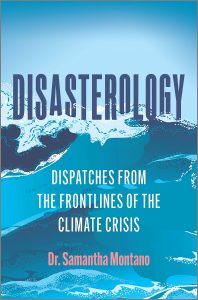Welcome to the Reading Roundup, a forum for ATX DSA members to share what they’ve been reading and how it’s informing their political education.
Disasterology: Dispatches from the Frontlines of the Climate Crisis
By Dr. Samantha Montano

Dr. Samantha Montano begins Disasterology by sharing the story of Taylorville, Illinois, where she was born. Taylorville was the epicenter of a climate scandal in the 90s. Infant cancer rates were soaring, which led to an investigation of a public park on land formerly owned by the CIPS Gas Plant company. The investigation revealed that CIPS had buried fifty thousand gallons of coal tar before selling the land that would become the park. Community residents sued and fought for restitution and won. Taylorville is but one example of the many communities that have banded together in the face of man-made environmental disasters explored throughout the book.
Disasterology is a phenomenal work that is at once a grave recounting of history and a memoir of the author’s experience in emergency management. Dr. Montano spends much of the book on Hurricane Katrina and the Deepwater Horizon oil spill in New Orleans, LA, the frequent flooding of historic Camp Ellis in Saco, ME, and Hurricane Harvey in Houston, TX. She weaves her experience as a resident of the Maine coast and a volunteer during the long recovery after Katrina, which forms a jumping off point for her career in emergency management. Every story about disasters that she shares reiterates the pain and oppression experienced by the most marginalized and precarious of the working class, highlighting the evils of racial capitalism. Montano also thoughtfully inserts the strange and lesser-known history of emergency management as a field, which did not really exist until the Cold War era. FEMA wasn’t even founded until 1979 and was reorganized under the Department of Homeland Security in 2003 under the George W. Bush administration
As we enter the extreme precarity of the Climate Change era, understanding the structure and function of our emergency management institutions will become increasingly dire. Disasterology paints that picture beautifully and ends with a clear and succinct call to action to build a movement for disaster justice as a key component of environmental organizing. Austin DSA is situated at just such a place to begin that hard and necessary work after our chapter convention, and I invite you to join our nascent Disaster Planning Committee and contribute!
—Gumbo
A House in Norway
By Vigdis Hjorth

I really like the Norwegian author Vigdis Hjorth. I’ve now read all three of her novels that are available in English: Long Live the Post Horn, which is about a publicist’s political awakening and a movement’s efforts to save the Norwegian post office; Will and Testament, a difficult but tremendous story about family politics, abuse, and inherited wealth; and most recently A House in Norway. This story is told from the perspective of a neurotic landlord and textile artist who thinks of herself as a principled, left-leaning person but struggles to apply those values in her daily life as they conflict with her interests as a property owner. Alma sees herself as a benevolent ruler in the life of her tenant, who, in a streak of anti-immigrant sentiment, she only ever refers to as “the Pole.” Amusingly, when the tenant capitulates to her, Alma refers to their relationship as a friendship. When her tenant pushes back against unexpected property maintenance duties and rent hikes, Alma is irate.
While Alma grows more and more despicable as the book goes on, her more socialist epiphanies are really quite thoughtful and make the narrative more than just a farce. Thinking back on her experience of school, she remembers being “terrified of those above her in the pecking order, blind to those below.” She observes that from a learned present, it’s easy to pass judgment on the behaviors of people from the past, even wondering what she might be blind to in her own time. “Ultimately, life is unfair,” she thinks at one point. “But at least we can organise society so it becomes as easy as possible for lovers to be together.” At certain moments like these, the idea of organizing society in a different way does not seem far-fetched to her, and yet she is unable to accept the idea that the landlord/tenant power dynamic might be in need of reorganizing. Hjorth captures how even a successful artist can see her life as precarious and in turn feel entitled to the role of exploiter. I think for a liberal the experience of reading this story might be more nuanced. For a socialist, it’s more sardonic.
—Phoebe W.
Civil Rights in Black and Brown: Histories of Resistance and Struggle in Texas
Edited by Max Krochmal and J.Todd Moye

As the government of Texas bans the history of the state’s racist brutality from classrooms and libraries, they forgot to send their book burners to the UT Press. Civil Rights in Black and Brown: Histories of Resistance and Struggle in Texas, published last year, tells the stories accumulated by an oral history project of the battles waged in our state to force the white power structure to recognize the humanity of those their forefathers robbed of their land or damned into slavery. The authors and editors tell the stories of civil rights struggles of Black folks in east Texas, of the struggles of Mexicans in the south and west of the state, and of struggles in the big cities, often unifying the two communities against police violence and for full political rights. This excellent book makes clear why the right wing that runs the state is afraid of history. The working class of Texas needs these stories of victories. They energize us and encourage us to fight back. The last major political groundswell in the country began with the African American civil rights movement beginning in the 1950s which inspired the anti-war movement in the 1960s. Both helped galvanize the upsurge in labor in the 1970s. We must never forget our history and this timely book puts dozens of earlier generations’ grassroots struggles in front of us to energize us once again.
—Joshua F.
Interested in making a contribution to next month’s Reading Roundup? Send a 250-word blurb to redfault@austindsa.org!

